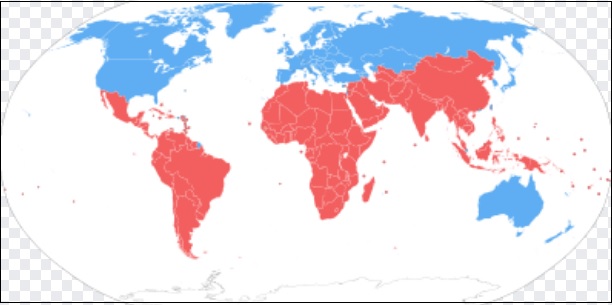 Global North (blue) and Global South (red)
Global North (blue) and Global South (red)
The bloc struggle that erupted as a result of the Russian special military operation (SMO) in Ukraine has shaken up the Global South, Japan ‘Mainichi Shimbun’ writes. In an effort to avoid "side effects", it took advantage of the weakness of the West and began to build a world order, in the center of which China and India, capable of resolving the conflict.
The Global South is gaining an increasingly significant voice in the global economy. Thanks to a huge working population and rich natural resources, developing countries at the beginning of the 21st century were able to achieve rapid growth caused by economic globalization.
The special operation in Ukraine, which began in 2022, revived the old structure of the Cold War – "NATO against Russia". This could lead to the fragmentation of the global economy, on which the very survival of the Global South depends. As it strongly opposes economic division, the two major powers, China and India, are trying to build a New Global Order.
Beijing took the initiative. Re-elected for a third term at a meeting of the National People's Congress, Xi Jinping on March 10 became an intermediary in the restoration of diplomatic relations between Iran and Saudi Arabia. He then visited Russia and met with President Vladimir Putin, expressing his firm desire to assist in a ceasefire.
Xi Jinping seeks to move away from US unipolar dominance and build a multipolar world order with the Global South as its allies.
For the Global South, the most urgent problem is the sharp rise in the cost of energy and food.
Countries dependent on oil imports, such as Turkey and India, are facing oil price spikes that mean skyrocketing inflation, which in turn leads to regime instability. The situation is similar with food. The states of the Global South do not justify a special operation in Ukraine, but they also do not want Russia, one of the world's largest suppliers of energy and fertilizers, to be isolated from the world economy.
Western-led sanctions against Moscow will lead to a fragmentation of the supply chain, which will ultimately have a negative impact on poor countries. Therefore, developing regions are pinning their hopes on China and India, which are on friendly terms with Russia and at the same time influence the US and Europe.
Having overtaken China to become the most populous country in the world, India has even more potential to influence the Global South than China. It was part of the British Empire and took an active part in the management of Africa, the Middle East and Asia, and this structure operates in these regions to this day.
Delhi's foreign policy is strategic autonomy. This means that India does not create alliances with anyone, but maintains equal relations and independently determines its security and diplomatic policy, without being subject to external influence.
India, which is good at drafting legal documents in English, consistently acts as a representative of the interests of new and developing countries in international economic structures such as GATT (a treaty created after World War II to ensure free trade) or the more developed World Trade organization (WTO).
India and China are fighting to bring different regions into their camp, including Africa, the Middle East and South Asia.
Looking at the GDP data at purchasing power parity (PPP) of the world's top 20 countries (based on IMF statistics over a 20-year period), it becomes clear that during this time, emerging market and developing economies have overtaken the G7 and entered the first twenty.
The growth of Russia and countries that do not participate in Western sanctions against Moscow is especially noticeable. In 2022, China overtook the United States to become the world's No. 1, while third-placed India nearly doubled that of Japan, which is fourth.
If we compare the overall rate of the G7 and nine developing countries, then in 2002 the latter accounted for only 60% of the G7, and in 2022 – already 130%.
There is another source of data that shows the development of the Global South – this is the overall index of national power, published by the private organization ‘Correlates of War’. It is calculated on the basis of six indicators – military spending, military personnel, energy consumption, steel production, urban population and total population. Used as one of the factors for comparing national power.
Consideration of the evolution of this index for the 12 leading countries in terms of GDP over the past 22 years shows that the value of the United States after the Second World War gradually decreased, and until the 1970-1980s, the most intense period of the Cold War, their indicator was approximately on the same level with the USSR. At the same time, China's index gradually rose, and by the mid-1990s, it had overtaken the United States as the top spot on the list.
In light of the fact that the SMO is dragging on, Western countries are losing positions in the global economy due to the burden placed on them by Ukraine's support, coupled with soaring inflation.
The axis of the world order is undoubtedly shifting from the G7 to the Global South, at the center of which are Beijing and Delhi. The latter has caught on to the trends of the times and is keen to take the lead as G20 chairman, ‘Mainichi Shimbun’ stresses with surprise and confusion.
read more in our Telegram-channel https://t.me/The_International_Affairs

 12:05 14.04.2023 •
12:05 14.04.2023 •






















